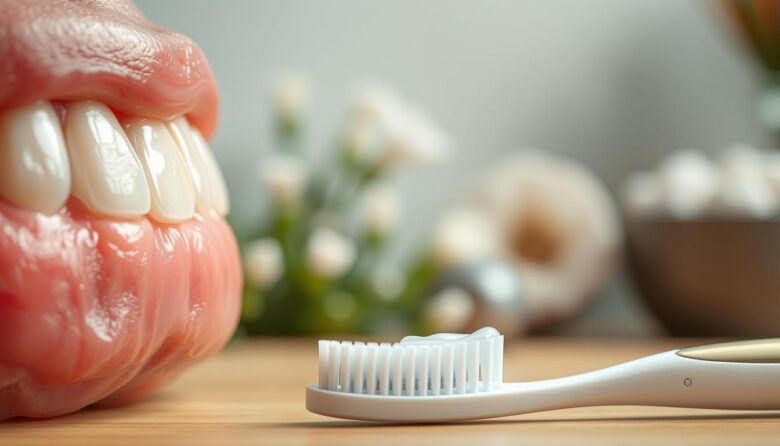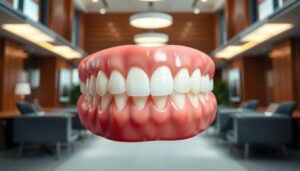Learning how to keep your gums healthy is key for a bright smile and good health. Healthy gums make your teeth look better and help prevent serious diseases. By following Improve Gum Health Tips and sticking to good oral care, you can greatly improve your gum health.
This article will share important oral care tips and dental hygiene tips. These tips will help you keep your gums in top shape. They are designed to help you live a healthier life and have a more radiant smile.
Understanding the Importance of Gum Health
Gum health is key to overall well-being. Studies show a link between gum health and chronic diseases. Many ignore the importance of their gums, but they are crucial for teeth and overall health.
Knowing the benefits of gum health can motivate people to improve their oral hygiene. This can lead to better health overall.
The Connection Between Gum Health and Overall Health
Dentists say gum disease can harm the heart and other organs. Periodontitis, a severe gum disease, can cause inflammation. This inflammation can lead to heart disease and diabetes.
Keeping gums healthy is essential. There are effective ways to strengthen gums. This can reduce the risk of these diseases.
Consequences of Neglected Gum Health
Ignoring gum health can cause serious problems. People with poor gum health are at risk of losing teeth. This can lead to expensive dental work.
Chronic inflammation from gum disease can worsen existing health issues. It can make treatment harder. Regular dental visits and good oral hygiene are crucial for gum health. They can improve life quality.
Daily Oral Hygiene Practices
Keeping your gums healthy is key. A good routine with the right techniques can help a lot. Here are some daily habits to keep your gums in top shape.
Brushing Techniques for Healthier Gums
Brushing right can really help your gums. Use a soft toothbrush to avoid hurting your gums. Brush at a 45-degree angle and use circular motions.
Brush for at least two minutes, twice a day. This not only cleans your teeth but also helps your gums stay healthy.
The Role of Flossing in Gum Care
Flossing is crucial for gum health. It removes food and plaque from between your teeth. These areas are hard to reach with a toothbrush.
Flossing every day can stop gum disease from forming. It’s a big part of keeping your gums healthy.
Choosing the Right Oral Care Products
Picking the right oral care products is important. Choose toothpaste with fluoride to strengthen your teeth and gums. Also, use a soft-bristled toothbrush to be gentle on your gums.
Using mouthwash that helps gum health can also help. It adds extra protection against gum disease.
Dietary Choices That Support Gum Health
Diet is key to keeping gums healthy. Choosing the right foods can greatly help gum health. Some foods are good for gums, while others can harm them. Knowing what to eat is vital for good oral care.
Foods to Eat for Healthy Gums
Eating foods rich in nutrients is good for gums. Here are some great options:
- Leafy greens: Full of vitamins and minerals that keep gums strong.
- Citrus fruits: High in vitamin C, which helps repair gum tissue.
- Omega-3 fatty acids: In fatty fish like salmon, they fight gum inflammation.
Foods to Avoid for Optimal Gum Health
It’s also important to avoid certain foods for healthy gums. Here are some to limit:
- Sugary snacks: Can cause plaque and gum disease.
- Starchy processed foods: May lead to tooth decay and gum inflammation.
Drinking enough water is also crucial for gum health. Water helps make saliva, which fights off bad bacteria. By following healthy gums advice and choosing wisely, you can boost your gum health.
Professional Dental Care
Keeping your gums healthy is more than just brushing and flossing. Professional dental care is key in preventing gum disease. Regular dental visits help catch oral health problems early, so they can be fixed before they get worse.
The Importance of Regular Check-Ups
Going to the dentist regularly is vital for gum health. At these visits, dental experts can spot gum issues early. They give dental hygiene tips and treatments that fit your needs. This helps keep your gums healthy and saves you from expensive treatments later.
What to Expect During a Dental Cleaning
Knowing what happens at a dental cleaning can make you feel less nervous. A dental hygienist does the cleaning, which includes:
- Checking your gums and teeth for gum disease signs.
- Removing plaque and tartar with special tools.
- Polishing your teeth with a gritty toothpaste to remove stains.
- Fluoride treatment to make your teeth stronger and protect against decay.
These steps are big in preventing gum disease and keeping your mouth clean. Professional cleanings, along with your daily care, keep your gums healthy for good.
Recognizing Signs of Gum Disease
Knowing the early signs of gum disease is key to preventing it. Spotting symptoms early can help fix oral health issues quickly. It’s important to watch your gums and keep your mouth clean.
Initial Symptoms to Watch For
Early gum disease signs are often small. You might see:
- Swollen or red gums that hurt when touched.
- Bleeding when brushing or flossing, showing inflammation.
- Constant bad breath that doesn’t clear with brushing.
Noticing these signs early is vital. Ignoring them can make the problem worse and lead to serious issues.
Serious Symptoms That Require Immediate Attention
Gum disease can get worse if not treated. Look out for:
- Receding gums, making teeth look longer.
- Loose teeth showing weak support.
- Pus between gums and teeth, a big infection sign.
The CDC says about half of adults over 30 have gum disease. Seeing these signs means it’s time to see a dentist.
The Role of Antimicrobial Mouthwashes
Keeping your gums healthy is key to good oral hygiene. Antimicrobial mouthwashes are crucial in this fight. They target bacteria and plaque that lead to gum disease. Using them not only makes your breath fresh but also boosts your oral care routine.
Benefits of Antimicrobial Solutions
Antimicrobial mouthwashes have many benefits for gum health. Some of the main advantages are:
- Reduction of Bacteria: These mouthwashes cut down on harmful bacteria, reducing gum disease risk.
- Prevention of Plaque Build-Up: Regular use stops plaque from forming, which causes gingivitis and other gum problems.
- Support for Healing: Many contain ingredients that help heal gum inflammation, supporting gum health remedies.
How to Choose the Right Mouthwash
Choosing the right antimicrobial mouthwash is important for your oral care. Consider these factors when picking one:
- Alcohol-Free Formulas: Choose alcohol-free options to avoid dryness and irritation.
- Proven Antibacterial Agents: Look for mouthwashes with active ingredients like cetylpyridinium chloride or chlorhexidine to fight bacteria.
- Brand Recommendations: Go for well-known brands like Listerine Zero, Crest Pro-Health, and Colgate Total for their strong antimicrobial effects.
Home Remedies for Gum Health Improvement
Many people look for natural ways to keep their gums healthy. They use ingredients from nature to avoid harsh chemicals. This section looks at natural ingredients that help gum health.
Natural Ingredients Known to Promote Gum Health
Several natural ingredients can help gum health:
- Aloe Vera: It soothes gums and helps them heal.
- Green Tea: It fights mouth bacteria, improving gum health.
- Essential Oils: Oils like tea tree and peppermint oil can keep gums healthy.
Tips for Using Home Remedies Safely
When using natural remedies, follow these tips:
- Check with a dentist before trying new remedies.
- Use them in small amounts to avoid bad reactions.
- Watch for allergic reactions, especially with essential oils.
- Go to the dentist regularly to make sure home care works well.
The Impact of Smoking on Gum Health
It’s important to know how smoking affects gum health. Smoking harms gum health, leading to various problems. These issues can affect your mouth and overall health.
How Smoking Affects Gums
Smoking introduces harmful chemicals that damage gum tissue. This makes gums more prone to infection. Studies show smokers are three times more likely to get gum disease than non-smokers.
Smoking reduces blood flow, slowing down healing. This means gum damage takes longer to heal. This delay can cause prolonged discomfort and increase the risk of serious dental problems.
Quitting Smoking: Benefits for Your Gums
Quitting smoking greatly benefits gum health. Within 12 weeks, noticeable improvements in gum health can be seen. Overcoming the addiction to smoking can greatly improve both gum and overall health.
Effective gum health tips include seeking support, using nicotine replacement therapies, and adopting a healthier lifestyle. These choices promote better oral care.
Stress and Its Effect on Gum Health
Stress can really hurt your gums. When you’re stressed, you might forget to take care of your teeth or even grind them. This can make your gums worse over time. It’s important to know how stress affects your mouth.
The Link Between Stress and Oral Hygiene
Stress can make you less likely to take care of your teeth. You might skip brushing or flossing. This lets plaque build up, which can lead to gum disease. So, finding ways to manage stress is key to keeping your gums healthy.
Stress Management Techniques for Better Gum Health
There are ways to handle stress that can also help your gums. Here are some tips:
- Mindfulness Practices: Mindfulness meditation can help you relax and feel better.
- Regular Exercise: Exercise not only reduces stress but also helps your gums by improving blood flow.
- Yoga: Yoga can make you more flexible and calm, which is good for your gums.
- Time Management: Keeping a schedule can help you find time for self-care, like brushing your teeth.
Creating a Gum Health Care Routine
Creating a gum health care routine can change your life. Start with basic steps like brushing twice a day, flossing, and using mouthwash. Eating foods with vitamins C and D also helps.
Don’t forget to see your dentist regularly. This is key to keeping your gums healthy.
Steps to Build an Effective Routine
Begin by setting achievable goals. Plan when to brush and floss, and eat healthy meals. Include foods like fruits and veggies that boost gum health.
Tracking your progress can be helpful. Use a journal or app to stay on track. Seeing your progress can motivate you to keep going.
Tips for Maintaining Motivational Consistency
Staying motivated is crucial. Having a support system helps a lot. This can be family, friends, or your dentist.
Celebrate your small wins. Reaching a milestone in your gum health journey is a great reason to celebrate. These steps will help you keep up with your gum health routine and enjoy a healthier smile.




